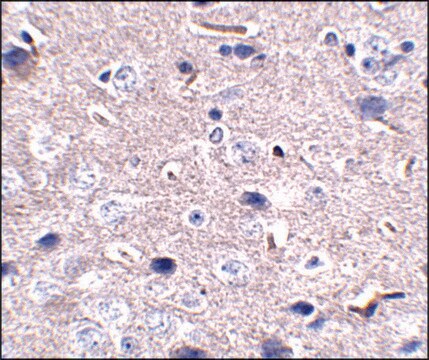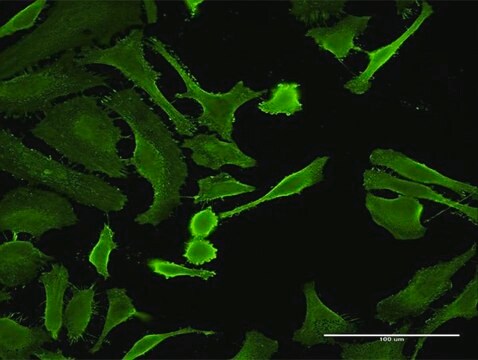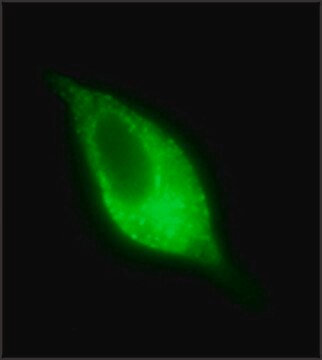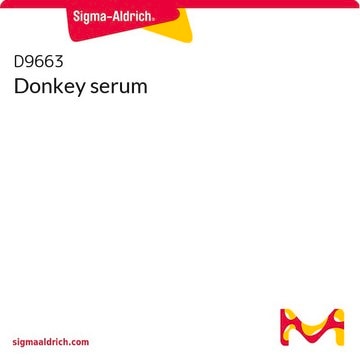おすすめの製品
由来生物
mouse
品質水準
結合体
unconjugated
抗体製品の状態
purified immunoglobulin
抗体製品タイプ
primary antibodies
クローン
AS32, monoclonal
形状
buffered aqueous solution
化学種の反応性
human
濃度
~1 mg/mL
テクニック
neutralization: suitable
western blot: suitable
アイソタイプ
IgG1
UniProtアクセッション番号
輸送温度
wet ice
保管温度
2-8°C
ターゲットの翻訳後修飾
unmodified
遺伝子情報
human ... CTLA4(1493)
詳細
CD152 is structurally similar to CD28 and is a member of the immunoglobin (Ig) gene superfamily. The gene encoding human CD152 is present on chromosone 2. It is composed of a single Ig V-like extracellular domain, a transmembrnne domain, and an intracellular domain. It is mainly expressed by cytotoxic T lymphocytes and the level of expression is activation-dependent.
免疫原
recombinant extracellular domain of human CD152.
アプリケーション
Monoclonal Anti-CD152 antibody produced in mouse is suitable for western blotting and for neutralization studies, where this antibody has been shown to block the interaction of soluble human CD152 with human CD80.
生物化学的/生理学的作用
CD152 and CD28 together with their ligands constitute one of the dominant co-stimulatory pathways that regulate T- and B-cell responses. CD152 acts as a co-stimulatory molecule in eliciting T cell help during antigen presentation and functions as a negative regulator of T cell activation.
ターゲットの説明
CD152, a cell surface glycoprotein, is one of two ligands (the other is CD28) for CD80 (B7-1) and CD86 (B7-2). This interaction appears to function as a negative regulator to T cell activation. CD152 is transiently expressed on activated T cells.
物理的形状
Solution in 0.01 M phosphate buffered saline, pH 7.4, containing 0.08% sodium azide.
調製ノート
Prepared from tissue culture supernatant, purified using protein G.
免責事項
Unless otherwise stated in our catalog or other company documentation accompanying the product(s), our products are intended for research use only and are not to be used for any other purpose, which includes but is not limited to, unauthorized commercial uses, in vitro diagnostic uses, ex vivo or in vivo therapeutic uses or any type of consumption or application to humans or animals.
適切な製品が見つかりませんか。
製品選択ツール.をお試しください
保管分類コード
10 - Combustible liquids
WGK
WGK 2
引火点(°F)
Not applicable
引火点(℃)
Not applicable
適用法令
試験研究用途を考慮した関連法令を主に挙げております。化学物質以外については、一部の情報のみ提供しています。 製品を安全かつ合法的に使用することは、使用者の義務です。最新情報により修正される場合があります。WEBの反映には時間を要することがあるため、適宜SDSをご参照ください。
Jan Code
C9979-BULK:
C9979-.1MG:
C9979-.1MG-PW:
C9979-VAR:
試験成績書(COA)
製品のロット番号・バッチ番号を入力して、試験成績書(COA) を検索できます。ロット番号・バッチ番号は、製品ラベルに「Lot」または「Batch」に続いて記載されています。
Danbee Ha et al.
Proceedings of the National Academy of Sciences of the United States of America, 116(2), 609-618 (2018-12-28)
Anti-CTLA-4 mAb is efficacious in enhancing tumor immunity in humans. CTLA-4 is expressed by conventional T cells upon activation and by naturally occurring FOXP3+CD4+ Treg cells constitutively, raising a question of how anti-CTLA-4 mAb can differentially control these functionally opposing
N J Karandikar et al.
The Journal of experimental medicine, 184(2), 783-788 (1996-08-01)
CTLA-4, a CD28 homologue expressed on activated T cells, binds with high affinity to the CD28 ligands, B7-1 (CD80) and B7-2 (CD86). This study was designed to examine the role of CTLA-4 in regulating autoimmune disease. Murine relapsing-remitting experimental autoimmune
T Lindsten et al.
Journal of immunology (Baltimore, Md. : 1950), 151(7), 3489-3499 (1993-10-01)
CTLA-4 is an adhesion receptor expressed on activated T cells. The amino acid sequence of CTLA-4 is related to CD28, and although the function of CTLA-4 remains unknown, it shares several features with CD28, including a common counter-receptor, B7, that
T L Walunas et al.
Immunity, 1(5), 405-413 (1994-08-01)
CD28 and CTLA-4 are related glycoproteins found on T cells. Ligation of CD28 following antigen receptor engagement provides a costimulatory signal required for T cell activation. Anti-CTLA-4 antibodies were generated to examine the role of the CTLA-4 receptor on murine
ライフサイエンス、有機合成、材料科学、クロマトグラフィー、分析など、あらゆる分野の研究に経験のあるメンバーがおります。.
製品に関するお問い合わせはこちら(テクニカルサービス)







